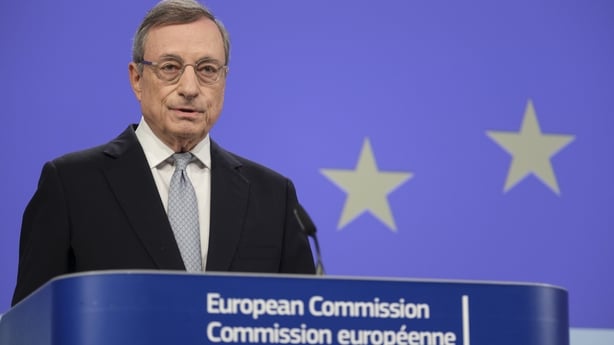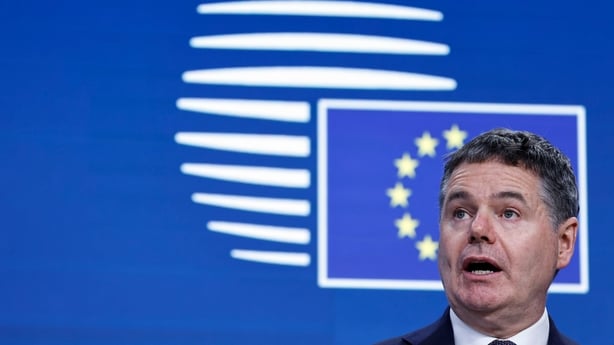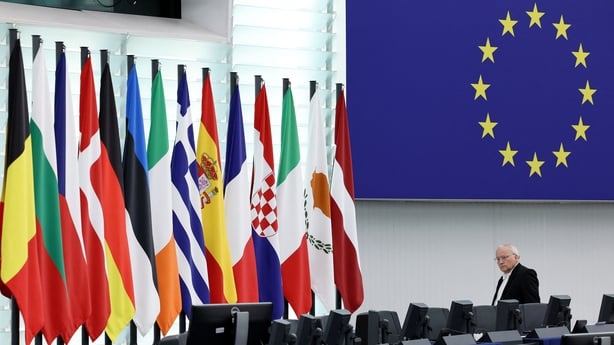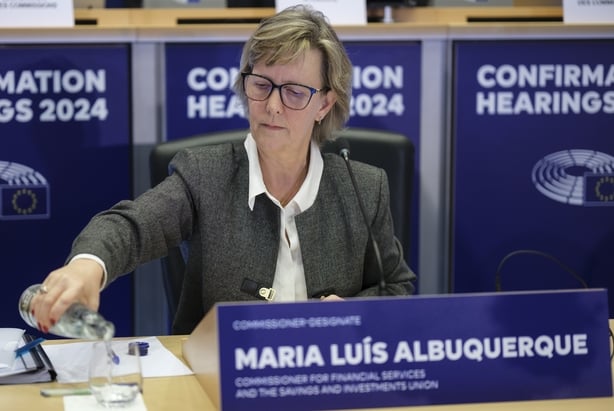When EU officials travelled to Washington recently, the US Federal Reserve Chair Jerome Powell showed them a chart showing American productivity over a 40-year period compared to European productivity.
The chart showed the US enjoying 2% growth, compared to 1% for the European Union.
"The difference is just enormous after 40 years in terms of incomes and living standards," Mr Powell told a US Senate committee in July.
"It's not comfortable for Europeans to look at this chart," said an official present. "It is very clear that the EU is in relative economic decline. If you're in relative economic decline, you are in relative political decline."
The sense of decline has become more acute.
The European Union has been facing multiple crises: the Covid pandemic, the Russian invasion of Ukraine, the need to transition to a net-zero economy, preparing for enlargement - all at a time when European competitiveness and productivity are already falling behind the US and China.
In other words, while Europe needed to reverse slow growth and increase competitiveness anyway, the crises of recent years have made that challenge all the more difficult.
Last year, the European Commission asked Mario Draghi, the former ECB president, to report on what Europe needed to do to both catch up, and to meet the current spending needs.
Mr Draghi’s report, published in September, said Europe needed to invest €750bn to €800bn per year, simply to meet existing needs.
These are huge sums.
To put it into perspective, during the last round of negotiations for the seven-year EU budget cycle, member states, the European Parliament and the Commission were scrapping over an amount of €50bn to close the deal.

"We keep saying we're at this crossroads," said Tony Murphy, the Irish president of the European Court of Auditors (ECA), "where we have these new big-ticket items like enlargement, like Ukraine, like security and defence. Where is the money going to come from?"
The first call will be on member states to make bigger contributions to the EU budget.
There are also the EU’s "own resources", namely customs duties, VAT receipts and fines levied by the European Court of Justice (ECJ), that add revenue to the EU budget.
On both counts, these will not be enough: member states are already in debt and getting agreement on new resources is always difficult.
That's why we're going to hear a lot more about a hitherto complex and obscure concept: a Capital Markets Union (CMU).
Simply put, Europeans keep an estimated €33 trillion in bank accounts.
That money could, it is argued, be more productively invested in European companies in order to boost innovation and to help the EU compete with the United States and China.
"All of these changes we need to do are massively expensive and they're massively expensive at a time when governments don't have the resources to make them," said another official.
"Yet, at the same time in Europe we have a huge number of people with private savings which are, for the most part, sitting in bank accounts earning very minimal amounts of interest."
European businesses more likely to seek bank funding - Donohoe
Two realities have held back small-saver retail investing in the EU.
Firstly, Europeans have not grown up with a culture of stock market investing compared to US citizens who need to invest for their pensions (they cannot rely on a state one) and have ease of access to a single national stock market in New York.
Secondly, the EU system for investing is fragmented across 27 stock markets.
There are different rules on taxation, pensions, insolvency and so on.
Furthermore, while there are players with advanced financial services sectors - Ireland, Germany, the Netherlands, France, Sweden, Denmark - countries, especially in eastern and central Europe, have much smaller operations.
Why does this relate to Europe’s competitiveness?
In the 21st century, and especially in the US, it is the startups that have driven innovation and economic growth.
They go to capital markets to raise funds, not to banks.
"The simple reality is that entrepreneurs and businesses in Europe are more likely to seek bank funding than their counterparts in the United States," Paschal Donohoe, the president of the Eurogroup of finance ministers, told a gathering in the City of London in September.
"Banks play a critical role enabling deeper and more liquid markets. But we know banks typically are more conservative in their lending and also more focused on domestic rather than international markets."
One EU official said: "We have a financial system which is good for the 20th century. In this century, it's all about small, fast-growing, risky companies, some of whom make it, many of whom don't. And that kind of financing doesn't come best from banks. It comes best from capital markets."

In his report, Mario Draghi points out that no company with a market capitalisation of over €100bn has been created from scratch in Europe in the past 50 years.
By contrast, there are six US corporations with a valuation above €1 trillion.
"The problem is not that Europe lacks ideas or ambition," Mr Draghi writes.
"We have many talented researchers and entrepreneurs filing patents. But innovation is blocked at the next stage: we are failing to translate innovation into commercialisation, and innovative companies that want to scale up in Europe are hindered at every stage by inconsistent and restrictive regulations."
As a result, European entrepreneurs seek financing from US venture capitalists and then often move their operations to the US in order to scale up.
European pool of capital for investment under discussion
Certain EU member states do have sophisticated capital markets.
The Netherlands, Sweden and Denmark are regarded as the gold standard when it comes to the propensity of people to invest in their future, in turn providing capital for corporates within their borders.
But they cannot compete with the US capital market.
"Let's be realistic," said one EU source familiar with the issue.
"None of the capital markets we have can ever reach the scale that can compete with New York. We lost London with Brexit. What we're left with are some developed markets, but none of them big enough, none of them scaled enough to compete globally."
In reality, the need for Europe to develop its own pool of capital to be invested has been kicking around for at least a decade.
Officials say the concept was a "nice to have" but not a "need to have".
However, EU leaders have been convinced by the pandemic, the war in Ukraine, the climate goals, that it is a "need to have".
"If we don't do this, we're going to continue to fall behind," said a senior official.
"The trend is quite frightening. It will accelerate, it will not get slower. Twenty years from now, we're not going to look all that big in the world."
According to one Irish Government minister: "If we don't have a capital markets union, then we're going to continue to lose investment to the US. We will have Irish companies that can't access scaling finance in the way that they need and, absolutely crucially, we will never have a proper retail investment strategy for people on regular salaries to be able to get a few quid invested in safe products."
Officials say that member states have now taken "ownership" of the idea.
In March, EU leaders pledged that a capital markets union would "provide European companies with access to more diversified financing at lower costs," as well as allowing EU citizens to invest their savings, all in the service of meeting the big challenges.

The European Commission believes its role will not be to develop a top-down capital markets system, but to remove the regulatory obstacles and national barriers so that member states can develop it themselves.
Since March, there has been plenty of activity on how member states can learn from each other and how to start lowering barriers to cross-border investing.
But national sensitivities are formidable.
Enabling citizens to invest their money - and enabling startups to access that money - across borders rubs up against sensitive national competences: taxation, insolvency law, pensions, securities law, areas which are not necessarily only financial.
"If you change insolvency law, you have to deal with justice ministers," said one EU official. "If you change taxation, it's not just about financial markets."
If an Irish person wants to invest in an exciting looking Estonian tech startup, they will need to have a clear picture of that startup’s listing on the Tallinn stock exchange, its reporting and accounting information, so that the investor can make an informed decision.
Lack of clear legal framework deterring cross-border investment in EU
There are other tensions around how a harmonised capital market would work.
Eastern European countries are wary that a capital markets union would just benefit the member states which already have advanced financial sectors.
One of those countries with an advanced financial sector, France, has already said it wants a single EU supervisor enforcing compliance, preferably based in Paris.
Eurozone finance ministers failed to get agreement on this in March, nor did EU leaders succeed in April.
Paschal Donohoe is thought to prefer a single rule book with oversight, and there are indications that the incoming Commissioner for Financial Services, Maria Albuquerque, is of a similar view.
One typical problem is how to handle disputes and remedies.
If an Irish investor puts their money into a company in Poland, what happens if there is a dispute over the amount invested? Unless there is a clear legal framework at EU level, and remedies where there are problems, then people will shy away from investing.
A persistently knotty issue is insolvency law, and how investors will have recourse if a company goes bankrupt.
Member states have been trying to agree minimum levels of harmonisation around aspects of insolvency law and a proposal is currently being considered, with the prospect of some elements being agreed first, and harder parts later.
There is talk of a so-called 28th regime.
This would be a separate (optional) legal framework created by EU member states where they harmonise the rules they can harmonise - such as corporate, taxation, insolvency law - and which would then be a simpler, more attractive space for innovative companies and investors.
On the question of insolvency law, that is one which is typically difficult for a common law jurisdiction like Ireland, where the remedies in cases of disputes are different to civil law, which applies everywhere else in the EU.
In general, the determination now by member states to finally make a capital markets union a reality comes with an acknowledgement that the swathe of new regulations following the global financial crisis - and the EU banking collapse - need to be relaxed.
In March, Eurozone finance ministers called on the Commission to "bring forward additional measures to reduce [the] regulatory burden in the EU’s financial market framework, in particular for smaller market participants."

One highly sensitive area is securitisation.
Recalling the global financial crash, one culprit among many was securitisation, such as the so-called credit defaults swaps which were bundled up, given a triple A credit rating and then sold on, despite the fact that the underlying asset was highly suspect.
As a result of the crash and the regulation which followed, the securitisation market contracted heavily across the EU, meaning there are hardly even enough qualified staff within the system to revive such a market.
"[Securitisation] is actually an essential tool for secondary markets to make markets liquid and work," said one official.
"One of the first things the new Commission is going to have to do is find a way of introducing securitisation."
How can common capital market work with differing tax rates?
Another issue attracting a lot of attention is taxation.
Can there be a Europe-wide capital market if each country applies different tax rates to investment products?
Ireland is a case in point.
It is a truism that it is cheaper for an Italian investor to access an Irish-domiciled investment product than an Irish one because of the taxes involved.
Ireland punitively taxes what are called exchange traded funds (ETFs).
Here smaller investors put their money in a basket of securities and commodities designed to track the performance of an underlying index.
The Irish financial services sector is a major hub for ETFs, with assets worth €1 trillion.
From a capital markets union perspective ETFs are important.
They are typically attractive to "retail" investors, as opposed to high-net-worth ones, because they provide exposure to a large number of markets or sectors through the purchase of a single security.
Small investors can invest modest amounts of money through ETFs, exactly the kinds of people the EU wants to incentivise.
Yet, ETFs are taxed more highly than regular shares (at 41% with holders having to report them through self-assessment), and every eight years the Revenue Commissioners also impose what is called a "deemed distribution" tax, whether the assets are sold or not.
These turn Irish investors off.
In Germany, where ETFs are much more tax efficient, they are hugely popular.
Former finance minister Michael McGrath ordered a funds review to look at how Ireland could lower some of its own barriers, including how ETFs are taxed, as part of the EU push to learn best practice.
The review quoted a Central Bank of Ireland survey that found that in 2015, only 5% of Irish resident holdings of ETFs were held by households.
That number had fallen further to 3% by 2019, with the tax applied being the main turn-off.
The report concluded that "measures proposed for amending the existing taxation of investment funds and life assurance products should be prioritised".
The review was too late for the Finance Bill, so it will fall to the next government.

Irish financial literacy lagging behind counterparts
If many of these issues are turn-offs for people, or complicated, then that has prompted another attempt to coordinate member state readiness including increased focus on financial literacy, or the ability for people (also schools and SMEs) to understand money, consumer protection, budgets, debt, pensions and investment.
The government’s Retail Banking Review in November 2022 recommended a national financial literacy strategy, which is currently being developed.
While the report said 57% of Irish adults met the minimum OECD level of literacy, a Bank of Ireland/Red C survey in 2023 found that Irish people had an average score of 54%, compared to 67% for the UK, 66% for Germany and 64% for Australia.
"European citizens are very good savers but not great investors, and Irish households are amongst those with the lowest participation rates in capital markets," said Umar Ahmed, Director of EU Affairs with Irish Funds, the representative body for the international investment sector.
"Investing is essential for long-term financial wellbeing and financial literacy will give citizens greater security, control, and understanding of their money and savings."
Ultimately, even if a concerted effort to build a Europe-wide capital markets entity succeeds, one which will incentivise ordinary citizens to invest their savings in a safe and financially rewarding way while also giving European startups and scale-ups greater access to capital, there will be a daunting question.
Higher returns will still come from investing in US corporations, or at the very least European ones which have scaled up in America.
Investors will have to ask themselves, are they in it for a big return, or to help boost the European economy, and to help Europe meet the big challenges?
"Is the idea of more retail participation only about boosting returns?" asked one EU source.
"In which case, you might put everybody into tracking the global indices, which are sixty to seventy to eighty percent US-owned."
There will be further debates about using tax incentives to prioritise investment in European green tech.
There will undoubtedly be a debate in Ireland about whether a surge in retail investment, through a Savings and Investment Union (the recent rebranding of the capital markets union), might steer investors towards, for example, the defence sector.
Others will argue that, regardless of Ireland’s neutrality, the defence forces are in desperate need of new capabilities, and if they are cheaper, and European-made, all the better.
Either way, even if the project has broad - and urgent - support from member states, it will be years in the making.






